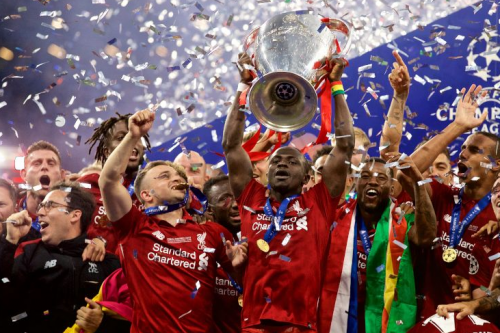Global bank bows to shareholder pressure over executive remuneration

Standard Chartered bank, the main shirt sponsor of Liverpool FC, has bowed to shareholder pressure and revised pension and pay terms for its chief executive and finance chief.
In a stock exchange announcement this morning it said it had made the changes following extensive consultations with key shareholders following initial concerns earlier this year when 40% of investors voted against the pay policy at the bank’s AGM.
Standard Chartered said today: “As a result of the level of votes at the 2019 AGM opposing the directors’ remuneration policy, Standard Chartered PLC’s remuneration committee announced on 8 May 2019 that it would engage further with shareholders to listen to their views on specific areas of the policy. The committee also committed to publish an update on that engagement in November.
“The chair and members of the committee, and the group chairman engaged with shareholders representing approximately 60% of the group’s issued share capital, with the Investment Association that represents over 250 UK investment management firms, and with other major shareholder advisory bodies.
“There were a broad range of views and, in reaching a conclusion, we have sought to find a reasonable solution to reconcile these different opinions and resolve concerns.”
Consequently, the committe has decided to change the contractual terms and conditions for chief executive Bill Winters and finance chief Andy Halford and reduce their pension allowance from 20% of salary to 10% of salary with effect from January 1, 2020.
It will continue to pay executive directors’ salaries as a mixture of cash and shares. The share-based component is released over five years to strengthen shareholder alignment and focus on long-term value creation. It is not variable or performance-related pay
The bank will also improve the disclosure in the 2019 directors’ remuneration report on the structure of fixed pay, and how it aligns with the wider workforce and complies with the UK Corporate Governance Code.
It said both executive directors have accepted this change.
This will result in Bill Winters’ pension allowance reducing by 50% from £474,000 (20% of salary) to £237,000 (10% of salary).
Andy Halford’s pension allowance will reduce by 50% from £294,000 (20% of salary) to £147,000 (10% of salary).
These changes will align their pension arrangement with UK employees from January 1, 2020.
The bank said this is a reduction of eight per cent in fixed pay (salary plus pension allowance).
It also stressed that no compensation is being given to the executive directors for the reduction in their pension allowance.
Christine Hodgson, chair of the Standard Chartered remuneration committee, said: “I would like to thank Bill and Andy for their willingness to agree to these changes and to thank our shareholders and their representatives for engaging constructively with the remuneration committee, and for the strong support that they share with the board for our executive directors.
“The changes we are making will align the current executive directors’ pension allowances with other UK employees with effect from 1 January 2020. This will result in a material change to Bill and Andy’s pension allowances as well as an eight per cent reduction in their total remuneration opportunity.”
Russ Mould, investment director at Manchester investment platform AJ Bell, said: “Shareholder pressure can make a difference.
“Six months after emerging markets bank Standard Chartered faced a major revolt on remuneration, with 40% of investors voting against the pay policy at its AGM, the company and its chief executive Bill Winters have been forced into an embarrassing climb-down over his generous pension allowance.
“Up until today the company has been effectively poking an angry bear when it comes to addressing investor concerns.
“First it tweaked the way it defined the pay of Winters and finance chief Andy Halford ahead of the AGM so that a cut in the percentage of salary paid into their pension actually saw contributions go up.
“Then Winters bit back at shareholders in July, describing their actions in raising concerns as ‘immature and unhelpful’ in a newspaper article.
“Now the pension contribution level of 10% is aligned with that of the bank’s other employees, although the new definition of pay still stands which may frustrate some.
“So why did Standard Chartered go down this road in the first place?
“There is an argument that companies compete in a global marketplace for executive talent and they will look to do whatever they can in terms of rewards to attract and retain this talent.
“This argument looks stronger when shareholders are also being richly rewarded, yet since Winters took charge in June 2015 the company has posted a total return of -20.5%.”








